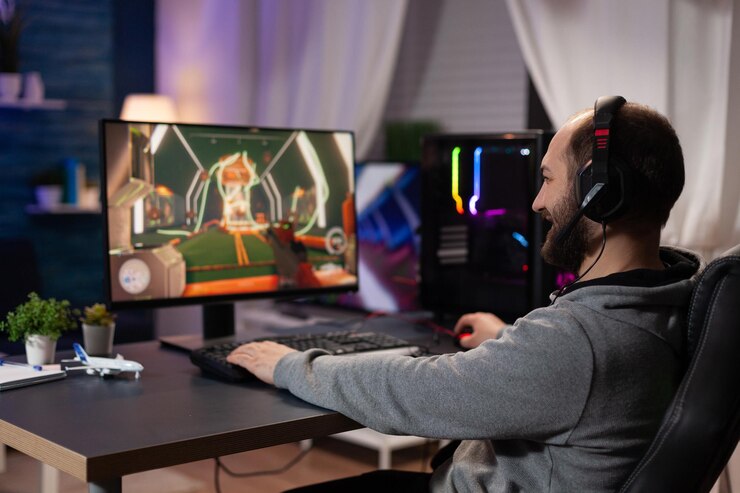Introduction
Game development has come a long way from the simple pixelated screens of early arcade https// gamemakerblog.net, immersive experiences we see today. It’s not just a hobby; it’s a significant part of the tech industry. For indie game developers, game designers, and tech enthusiasts, understanding the intricacies of game development can be both a thrilling and daunting venture. This blog post will explore the evolution of game development tools, the impact of AI on game design, the vital role of indie developers, strategies for effective game marketing, and the future trends and opportunities in game development.
The Evolution of Game Development Tools
From Pixels to Polygons
The history of https// gamemakerblog.net tools is a fascinating one. Early game developers had limited resources, often working with basic programming languages and hardware constraints. Classic games like “Pong” and “Space Invaders” were created with rudimentary tools but laid the foundation for the gaming industry.
Enter the Game Engines
The introduction of game engines marked a significant turning point. Engines like Unity and Unreal Engine revolutionized the way games were developed, offering more sophisticated tools for creating complex graphics, physics simulations, and user interfaces. These engines democratized game development, making it accessible to a broader audience.
The Rise of No-Code Platforms
In recent years, we’ve seen the rise of no-code and low-code platforms. Tools like GameMaker Studio allow even those with minimal programming knowledge to create compelling games. This accessibility has sparked a surge in indie game development, enabling creative minds to bring their visions to life without extensive coding skills.
The Impact of AI on Game Design and Development
Enhancing Game Mechanics
Artificial intelligence has significantly impacted game mechanics. AI algorithms can control non-player characters (NPCs), making them more realistic and challenging. Games like “The Last of Us Part II” showcase advanced AI that adapts to player actions, creating a more engaging experience.
Procedural Content Generation
AI is also used in procedural content generation, where algorithms create game environments, levels, and even narratives. This approach allows for vast, dynamic worlds that can adapt to a player’s actions, ensuring no two experiences are the same. Games like “No Man’s Sky” leverage this technology to offer a universe of endless possibilities.
Personalized Gaming Experiences
AI enables personalized gaming experiences by analyzing player behavior and adapting the game accordingly. This can range from adjusting difficulty levels to recommending in-game purchases tailored to the player’s preferences. Such personalization keeps players engaged and enhances their overall gaming experience.
The Role of Indie Game Developers in the Industry

Creativity and Innovation
Indie game developers are often at the forefront of creativity and innovation. Without the constraints of large corporate entities, they have the freedom to experiment with unique game mechanics, art styles, and narratives. Titles like “Celeste” and “Hades” have received critical acclaim for their originality and gameplay.
Community Engagement
Indie developers often build strong communities around their games. Platforms like Kickstarter and Patreon allow developers to engage directly with their audience, gathering feedback and financial support. This community-driven approach results in games that are finely tuned to meet player expectations.
Economic Contributions
Indie games are not just passion projects; they contribute significantly to the economy. Successful indie titles generate substantial revenue and create job opportunities within the industry. They also drive competition, pushing AAA studios to innovate and improve their offerings.
Strategies for Effective Game Marketing
Building a Strong Brand
Effective game marketing starts with building a strong brand. This includes creating a memorable logo, consistent visual identity, and a compelling narrative around your game. A strong brand presence helps your game stand out in a crowded market.
Utilizing Social Media
Social media platforms are powerful tools for reaching your target audience. Platforms like Twitter, Instagram, and TikTok allow you to share updates, engage with fans, and build hype around your game. Regular posts, interactive content, and influencer collaborations can significantly boost your game’s visibility.
Leveraging Influencer Partnerships
Partnering with influencers can amplify your game’s reach. Influencers have dedicated followings who trust their recommendations. By collaborating with influencers who resonate with your game’s target audience, you can generate buzz and attract new players.
Future Trends and Opportunities in Game Development
Virtual Reality (VR) and Augmented Reality (AR)
The future of game development is closely tied to advancements in VR and AR. These technologies offer immersive experiences that blur the lines between the digital and physical worlds. Games like “Beat Saber” and “Pokémon Go” demonstrate the potential of VR and AR to captivate audiences in new and exciting ways.
Blockchain and Gaming
Blockchain technology is making its way into the gaming industry, offering new opportunities for game developers and players alike. Concepts like play-to-earn and non-fungible tokens (NFTs) are creating decentralized gaming economies where players can earn real-world value through in-game activities.
AI-Driven Game Development
AI’s role in game development will continue to grow. Future games may feature even more advanced AI, capable of creating highly personalized and adaptive experiences. This could lead to games that evolve in real-time based on player interactions, offering endless relatability.
Conclusion
Game development is an ever-evolving field with immense potential. From the early days of pixelated screens to the sophisticated AI-driven experiences of today, the industry has come a long way. For indie game developers, game designers, and tech enthusiasts, staying abreast of these advancements is crucial. By understanding the evolution of game development tools, leveraging AI’s capabilities, appreciating the role of indie developers, and employing effective marketing strategies, you can position yourself at the forefront of this dynamic industry



